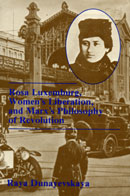

|
|

Rosa Luxemburg, Women's Liberation, and Marx's Philosophy of Revolution
Dunayevskaya, Raya
Publisher: Humanities Press, Atlantic HighlandsYear First Published: 1981 Year Published: 1982 Pages: 234pp ISBN: 0-391-02793-X Library of Congress Number: HX273.L83D86 1982 Dewey: 355.4 Resource Type: Book Cx Number: CX6547 Part I - Rosa Luxemburg as Theoretician, as Activist, as Internationalist. Part II - The Women's Liberation Movement as Revolutionary Force and Reason. Part III - Karl Marx: From Critic of Hegel to Author of Capital and Theorist of "Revolution in Permanence." Abstract: Dunayevskaya writes: By mid-August, when Luxemburg was working on The Mass Strike, the Party and the Trade Unions, it was clear that, far from the pamphlet's being restricted to the topics in the title, Luxemburg was, in fact, beginning to question not just the conservative trade union leadership, but the relation of Marxist leadership to spontaneity. She had always been highly responsive to proletarian acts of spontaneity. What was different this time was that the 1905 Revolution had disclosed a totally new relationship also to Marxist leadership. The most exciting phenomenon was that the so-called backward Russian worrkers had proved themselves far in advance of those in the technologically advanced countries, particularly Germany. Moreover, the Russian Revolution was not just a national happening. In its impact on both East and West, it had displayed an elemental force and reason of world scope. Luxemburg at once began working out its application to Germany. It a word, spontaneity did not mean just instinctive action as against conscious direction. Quite the contrary: spontaneity was a driving force, not only of revolution but of the vanguard leadership, keeping it left. As Luxemburg expressed in her pamphlet: "The element of spontaneity, as we have seen, plays a great part in all Russian mass strikes without exception, be it as a driving force or as a restraining influence... In short, in the mass strikes in Russia, the element of spontaneity plays such a predominant part, not becuase the Russian proletariat are 'uneducated,' but because revolutions do not allow anyone to play schoolmaster with them." Subject Headings
|